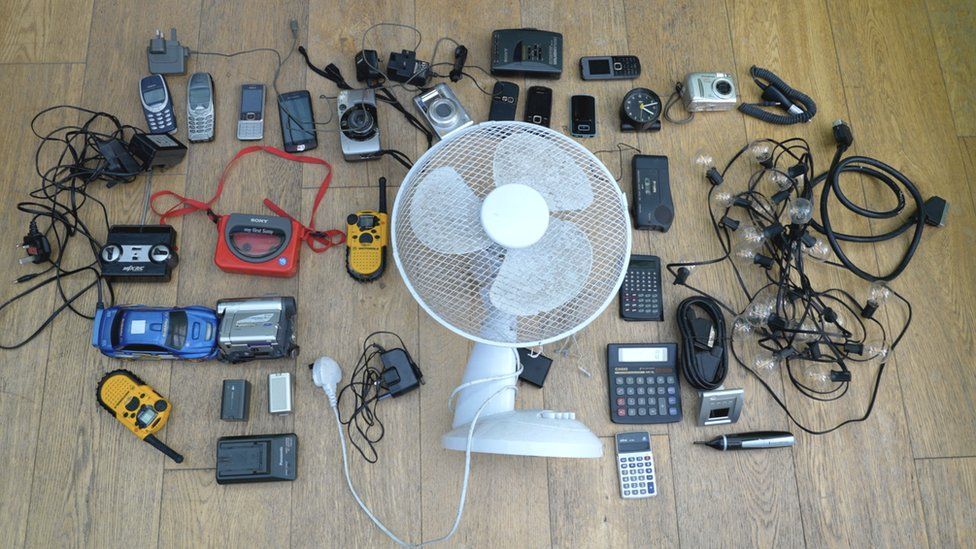E-waste 'drawers of doom' growing, say campaigners
- Published
- comments

Household hoards of unused electricals and broken tech are growing, a recycling campaign group warns.
Material Focus estimates we've gone from stockpiling an average of 20 items to 30 within four years.
Its findings come from market research. The top ten products include remote controls, mobile phones and hairdryers.
With the UN reporting that electronic waste is rising five times faster than documented recycling, we're being urged to clean out our "drawers of doom".
"I think back in the day my dad would have had a shed full of jars of screws, and the modern dad has a drawer full of 15 old mobiles," says Paul Bowtell, a self-proclaimed hoarder of electricals.
He counted more than 40 electrical items in just a couple of his storage boxes.
But there's more, he admits, in the attic, drawers, a footstool and other boxes.
The Bristol dad says there are things he's looking after for his grown-up sons, and items which were once expensive and now hold no value, so it's hard to say goodbye.
Scott Butler, executive director of Material Focus, says we've probably all got a "drawer of doom", which has "got cables in there that we don't know what they're for: it's got a DVD remote for a DVD player that we lost a long, long time ago".
The group - which runs an electricals recycling campaign and postcode search for householders to find drop off points - estimates over 880 million unused items are being held in UK homes. It warns trashed electronics should never go in the general waste.
"If you look at the electricals that we're throwing away and that we're holding onto [in the UK], we think over a £1bn billion in value of 'treasure', is sitting there untapped," says Scott Butler. "That material is also quite crucial for the green technology future that we're aiming for."
Inside old laptops, electric toothbrushes and shavers is a trove including steel, aluminium, copper, lithium batteries and even gold.
Justin Greenaway, commercial manager of SWEEEP, a specialist household electrical recycling centre, says that whenever there's anything complicated going on inside a computer, with lots of data moving around, all the connections need to be finished with gold to stop the data becoming corrupted.
"Our process allows us to recover that gold and get it back into use again. Obviously if we don't capture it and it goes into landfill or incineration that gold is lost."
Mining such precious materials in the first place leads to pollution, harms wildlife and contributes to climate change, as extracting raw materials, followed by manufacturing them into products is very carbon intensive.
"It's not just about recycling electricals... It's about getting the value out of them," Sarah Burns, the sustainability and engagement manager from Bristol Waste says. "The first thing we would look to do is to reduce the electrical items in the first place."
One way of keeping unused electrical items in circulation to extend that value, is to share them.
For example, at Share Bristol - A Library of Things, instead of borrowing books you can borrow sanders, hedge trimmers and popcorn makers amongst other items you're unlikely to use every day.
Anna Perry, one of the trustees, donated her jet washer to the scheme.
"I knew that a jet washer would be well used and really popular, but I didn't think my jet washer would be used for 19 different projects by 19 different people," she explains.
Even redundant laptops can find new homes, once they've been wiped of data.
"If you're lucky enough to have a spare laptop or smart device, search "recycle your electricals" and you'll see reuse and drop off points where people can donate to those in need," adds Scott Butler from Material Focus.
Data from Material Focus suggests households are throwing away 103,000 tonnes of electricals, rather than recycling them.
The organisation also estimates that 343,000 tonnes of electrical waste is being stolen from within the waste system or illegally exported.
To calculate the estimates on what we're holding onto, Material Focus used data from recent market research where 2,000 adults were polled across the UK by companies that are members of the British Polling Council.